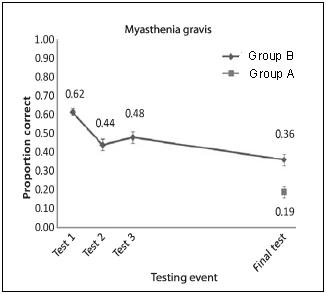Forgetting Curve: Evidence from Medical Education that Quizzes Do Slow the Forgetting Curve
Forgetting Curve:  Posted by John Kleeman, via the Questionmark Blog
Posted by John Kleeman, via the Questionmark Blog
I’ve recently come across a really exciting set of results from a study of doctors-in-training that show quizzes really do slow down the forgetting curve.
To remind you, once we learn something, we start to follow a downwards “forgetting curve”. Psychology research says that taking quizzes and tests can reduce the forgetting curve by giving us retrieval practice, which helps retain information. But it’s rare to see this shown in action quite so vividly as in an experiment conducted with doctors-in-training and published in the respected Medical Education journal. (The citation is: Larsen, D. P., Butler, A. C. and Roediger III, H. L. (2009), Repeated testing improves long-term retention relative to repeated study: a randomised controlled trial. Medical Education, 43: 1174–1181.)
In this experiment, Dr Douglas Larsen and colleagues Butler and Roediger from Washington University in St Louis divided some doctors-in- training into two groups of about 20 people each. The doctors were learning about two medical topics : status epilepticus and myasthenia gravis, abbreviated to SE and MG below.
Group A did the following:
- Study session on both SE and MG
- Quiz on SE immediately after the session and equal re-study time spent on MG
- 2 weeks after study session, quiz on SE and equal re-study time on MG
- 4 weeks after study session, quiz on SE and equal re-study time on MG
- 6 months later, test on both SE and MG
Group B did the same with SE and MG switched round, ie
- Study session on both SE and MG
- Quiz on MG immediately after the session and equal re-study time spent on SE
- 2 weeks after study session, quiz on MG and equal re-study time on SE
- 4 weeks after study session, quiz on MG and equal re-study time on SE
- 6 months later, test on both SE and MG
If spending time on re-study and taking a quiz have equal benefit to retention, then you would expect that both groups would perform about the same on the final test.
But if taking a quiz does actually aid retention and slow down forgetting, then you would expect that Group A would do better on SE than group B, and that group B would do better on MG than group A.
So what did happen? Here are the results for topic SE; you can see that group A initially scored an average of 78% and then knowledge reduced over time to 42% on the final test. However group B got a final score of 31%, much lower.

And here are the results for topic MG; group B, who did the earlier quizzes/tests on MG, scored an average of 36% on the final test, but group A, who’d just done the studying, got 19%.

These results show very clearly that taking the quizzes/tests helped people retain information vs. spending the same amount of time re-studying. And the study gives a dramatic picture of what happens in real learning – how people do forget, but also how quizzes and tests can reduce this.
Related posts:
- Multiple choice quizzes help learning, especially with feedback
- Assessment for virtual training
- Professor Roddy Roediger on applying the retrieval practice effect to creating and administering assessments
- Case Study: Medical School Quickly Deploys Online Assessments
- Answering questions directly helps you learn
==================================================================
To Discuss how these Solutions will add value for you, your organization and/or your clients, Affinity/Resale Opportunities, and/or Collaborative Efforts, Please Contact:
Tom McDonald, tsm@centurytel.net; 608-788-5144; Skype: tsmw5752